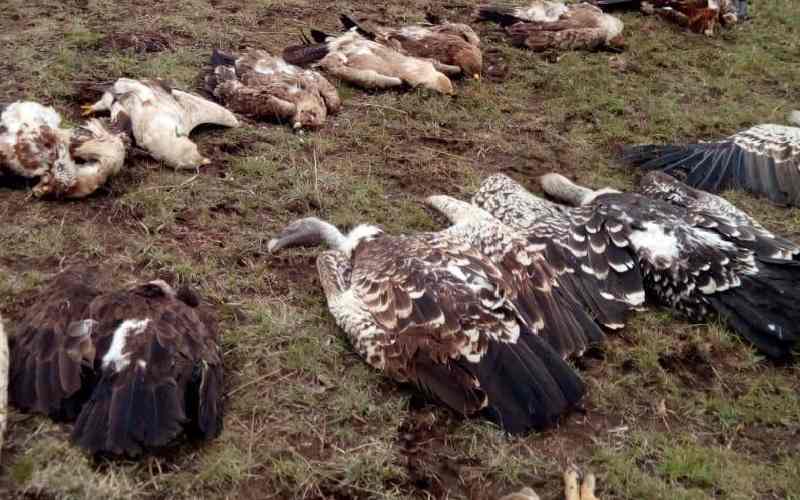Eighteen vultures have reportedly died in Laikipia after feeding on the suspected poisoned carcass of a camel.
The Kenya Wildlife Service is investigating the circumstances under which the vultures died.
In a statement, KWS noted that preliminary investigations show the carcass had been poisoned to trap a lion.
The case shines the light on human-wildlife conflict in the area, where residents resort to other means to keep wild animals away.
The wildlife agency's statement further added that samples from the vultures were taken to the government chemist for analysis.
The vulture carcasses were disposed off to prevent possible spread of disease.
Cases of wildlife poisoning in retaliatory attacks have been on the rise, with massive deaths of vultures being reported.
Areas that have recorded cases of vulture poisoning include Maasai Mara, Amboseli and Laikipia.
Human-wildlife conflict cases have been reported in the region for years.
In 2018, the most affected areas were Marmanent in Laikipia West and places bordering Rumuruti forest and Laikipia Nature and Conservancy.
Two people were killed, a woman injured and crops worth millions of shillings destroyed.
Among those killed were a Kenya Wildlife Service ranger who was attacked by an elephant while patrolling Rumuruti forest.
In the same period, former Kinguka Primary School head teacher Richard Kinyua was killed at his home in Marmanet.
Farmers especially those along Ngare Narok River abandoned their trade as their crops kept being destroyed by the animals.
Jojas Ngure lost more than Sh500,000 in under four months after elephants invaded his two-acre cabbage farm. “I had taken a loan from a local bank to invest in the venture which has been ruined by the animals," he said.
Ann Giathaiga said she abandoned farming after her three-acre tomato farm was destroyed by elephants, making her lose Sh600,000 as a result.
Marmanet MCA Simon Kanyutu whose area was the most affected noted that the animals are from the nearby Rumuruti forest.Human-wildlife conflict cases have been reported in the region for years.
In 2018, the most affected areas were Marmanent in Laikipia West and places bordering Rumuruti forest and Laikipia Nature and Conservancy.
Two people were killed, a woman injured and crops worth millions of shillings destroyed.
Among those killed were a Kenya Wildlife Service ranger who was
attacked by an elephant while patrolling Rumuruti forest.
In the same period, former Kinguka Primary School head teacher Richard Kinyua was killed at his home in Marmanet.
Farmers especially those along Ngare Narok River abandoned their trade as their crops kept being destroyed by the animals.
Jojas Ngure lost more than Sh500,000 in under four months after elephants invaded his two-acre cabbage farm. “I had taken a loan from a local bank to invest in the venture which has been ruined by the animals," he said.
Ann Giathaiga said she abandoned farming after her three-acre tomato farm was destroyed by elephants, making her lose Sh600,000 as a result.
Marmanet MCA Simon Kanyutu whose area was the most affected noted that the animals are from the nearby Rumuruti forest.
